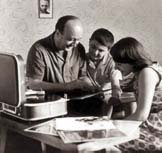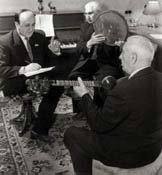|

Winter 1997 (5.4)
Pages
54-57
Folk Melodies
and Symphonic Masterpieces
Fikrat
Amirov
(1922-1984)
by
Jala Garibova
Left: Fikrat Amirov with his wife Aida, daughter
Sevil and son Jamil, who has grown up to become an accomplished
composer and musician himself (1959).
Middle: Fikrat Amirov with his children listening
to new music works (1967).
Right: Amirov's music was strongly influenced
by Azeri folk melodies. Here Amirov (left) works with well-known
mugam performers Khan Shushinski, singer (playing the round percussion
instrument called "gaval") and Gurban Primov (tarist).
____________
No doubt the
music of Fikrat Amirov (pronounced FEE-krat A-mir-ov and spelled
Fikret Amirov in Russian) has been heard outside of Azerbaijan
more than any other Azerbaijani composer. Unfortunately, millions
of people who have heard his music, probably don't know it's
his.
Michele
Kwan, 1996 World Champion Ice Skater used Fikrat Amirov's symphonic
piece,
"Gulustan
Bayati-Shiraz" in
her bid to defend her title as World Champion in 1997. In the
numerous competitions leading up to the world championship, she
skated to this music which usually was not identified. Each performance
attracted at least 20,000 spectators in the ice arena, not to
mention the millions who watched on national and international
television.
Amirov is no longer with us. He died in 1984 at the age of 62.
Last year (1997) marked his 75th Jubilee, but a composer of such
stature doesn't need the excuse of a Jubilee to be included in
our issue, "Legacy of Music." Amirov is truly one of
the greatest composers that Azerbaijan has ever produced.
Like many other
Azerbaijani composers who have left enormous
legacies to Azerbaijan's music heritage,
Fikrat Amirov grew up in an atmosphere of folk music. He was
born on November 22, 1922, in the city of Ganja in the north
central region of Azerbaijan. Fikrat's father, Mashadi Jamil
Amirov, was a famous "khanande" (mugam singer), who
composed and played tar (the traditional double-globed stringed
instrument which is plucked).
The most famous musicians of that period used to gather at Mashadi
Jamil's house. Among them was Bul-bul, one of the most well-known
vocalists of the day. Apparently, Bul-bul was among the first
to notice Fikrat's musical talent, and he invited the youth to
join other musicians who were collecting and documenting folk
songs throughout the countryside. It was an experience that would
influence Amirov's compositions for his entire life.
During his childhood and early adolescence, Fikrat began composing
pieces for the piano. "Variations" was one such piece.
Later he went back and edited it several times. This piece is
still included in the repertoire of Azerbaijani piano students
today. After graduating from Ganja Music College, Fikrat entered
Baku State Conservatory and studied under Boris Zeidman and Uzeyir
Hajibeyov.
But then World War II broke out in 1941. Amirov, who was only
19 at the time, was immediately drafted, and his studies at the
Conservatory interrupted. Amirov's first military assignment
took him to Tbilisi, Georgia. However, within a few months, he
ended up hospitalized for shell-shock. While being treated, he
formed an amateur music group which played Russian folk instruments,
and he became quite adept on the mandolin. But it wasn't long
before doctors discovered a serious intestinal disease which
needed immediate operation. For 13 days, the young lad lay in
a coma. The operation was so difficult that they were not able
to keep him in the army. By November 1942, he was back home.
By the next year, he was back at the Conservatory.
I.G. Plyam became Fikrat's piano teacher. His apartment was next
to hers. She recalls his diligence "I could hear how hard
he worked every day. For hours and hours, he would go over each
nuance elaborating each phrase." Plyam observed that Fikrat
stood out from the others from the very beginning. "Students
try to imitate others until they define their own way. Maybe
that's only natural. But right from the start, Fikrat's work
was original."
Growing Up With
Dad
According
to his son, Jamil, who is also a musician and composer, Amirov
followed a very strict schedule in regard to his creative work.
"He always started work early in the morning and continued
until lunch after which he would take a rest. Then he would continue
his work again. He followed the same routine everyday except
for Sunday. Dad rarely worked all night on a piece. He was not
one for 'all-nighters.' He mostly followed a calculated, methodical,
predictable schedule. And every day he worked the same hours.
He respected discipline, cleanliness and order."
Jamil recalls that he and his sister knew not to disturb their
father. "Sometimes, we had to tiptoe around the house so
as not to disturb him. I'm not exaggerating. The rule in our
house was 'father and his work-first-and then, everything else
followed. My mother, Aida, was a physician by training, but she
didn't work. She totally devoted herself to my father.
We weren't allowed to enter his room when he was working. He
was a diabetic, and Mom was very strict with his diet. She was
the only one who ever entered his room to bring him a cup of
tea or glass of juice. To tell you the truth, it's really not
surprising that he lived only six months after she died of cancer
in 1983. Dad relied on her tremendously. Without my mother, there
was no Fikrat Amirov."
Of course, there were times when he would break away from writing
music. "It's impossible to work on music continuously without
taking a break. You have to give your mind a rest. Dad liked
watching TV. He liked the news and was always curious about what
was going on in the world. He also loved meeting friends and
relatives. He enjoyed being together with people that he loved."
Jamil remembers his father as a kind, honest, loving and caring
person who always tried to help those in need. "A lot of
people, especially friends and relatives, used to ask him to
help them get jobs and apartments. Back in the Soviet period,
such things were often difficult to obtain. My father, as an
esteemed musician and a deputy in the parliament, often had access
to decision makers who could arrange these things, and he always
tried to help."
Jamil admits his own career in music was deeply influenced by
his father. "I grew up under his nose in an atmosphere of
music that was impossible to ignore." According to Jamil,
his father wasn't the best teacher. "Dad didn't have much
patience. It was very difficult for him to explain things, even
to me. Whenever I asked him to clarify something, he would get
hurt and upset. He thought I should have been able to understand
him the first time. He had his own idiosyncrasies. Mom knew best
how to deal with him."
But Jamil remembers his father as a person big enough to admit
his mistakes. This quality became obvious when he was choosing
his own career. "My father was involved in classical music,
but my inclination was towards modern music and jazz. At first,
my father didn't approve, and we had many arguments about it.
Finally, I persuaded him that all genres of music were valuable
and that all of them should be developed.
Eventually, he accepted my decision and conceded that there were
no 'bad genres-only bad works and bad performers.' He had wanted
me to continue in his path, but after he realized I had chosen
my own, he gave his approval."
The Amirov Sound
Fikrat Amirov's music, which mostly was written for the symphonic
orchestra, can be identified by at least three major characteristics,
according to Jamil. "The first is his very clear, rich,
strong melodic line which continues throughout the piece. Secondly,
each piece is always dramatic and full of color. To me, Dad's
works always sounded like they were created by a sudden illumination
inside him-as if the entire piece dawned on him from the moment
he began writing it. "
"Thirdly,
his pieces are marked by national coloring. You can always identify
folkloric elements in them whether they're Azerbaijani or Arabic,
as in the case of his ballet 'Arabian
Nights,'
his 'Concerto on an Arabian Theme for the Piano and Orchestra'
(together with Elmira Nazirova) and 'The Song of the Blind Arab.'"
The reason why there are such strong folkloric elements is because
he always did a lot of research before starting on such pieces.
For example, prior to composing his ballet "Arabian Nights,"
he visited several Arabic countries-Iraq, Yemen and Egypt-and
brought back tapes and records.
Consulting the
Orchestra
Alakbar
Iskandar, a professor at the Music Academy who performs with
the Azerbaijan State Orchestra, recalls working together with
Fikrat Amirov. "I've been working with the State Symphonic
Orchestra for many years. In the process of composing his symphonies,
he often came to see various members of the orchestra. It was
as if he were writing the piece just for that performer. He would
talk to flutists, oboists, bassoonists and other instrumentalists.
It wasn't that he didn't know the nuances of the orchestra; he
knew them as well as he knew his five fingers.
"I've seen composers make errors, for example, in naming
a key that doesn't even exist for a specific instrument. Fikrat
knew everything by heart. He was extremely demanding and exacting,
especially in terms of his own work. He could return to one small
section in a piece over and over again during rehearsals in order
to polish it. He almost always sang during practice. He had a
wonderful voice and used it to demonstrate musical phrasing.
He was a very neat person. It showed in his compositions. His
scores were like pieces of art-so beautiful and aesthetic to
the eye."
Amirov was very emotional. "Music without emotion was not
music for him. He lived and breathed music." For Iskandar,
the most obvious characteristic of Amirov's music was his economic
use of the orchestra. "In Amirov's compositions, there a
really no wasted, unnecessary notes. Everything is in harmony.
Everything has its proper place. For him, misusing instruments
in the orchestra was like going to the market and buying a lot
of frivolous things only to realize that you had wasted your
money and had nothing to show for it. Amirov never had that problem.
Every instrument had its place. Every single sound was relevant."
Amirov, of course, like any other composer, had his own favorite
composers. According to Jamil, they included Bach (1685-1750)
and Vivaldi (1678-1741) from the past, and 20th century composers
Bela Bartok (1881-1945), Dmitri Shostakovich (1906-1975) and
Azerbaijan's
Uzeyir Hajibeyov (1885-1948).
Amirov was involved with numerous responsibilities related to
music. He directed the Azerbaijan Opera and Ballet Theater (1956-59),
presided over the Azerbaijan Composers' Union in the 1960s and
headed the Soviet Composers' Union during the 1970s.
Prolific Composer
Amirov
was a prolific composer. His most famous pieces include symphonic
works such as "Shur" (1946), "Kurd
Afshari"
(1949), "Azerbaijan
Capriccio"
(1961),
"Gulustan
Bayati- Shiraz" (1968), "The Legend of Nasimi"
(1977), "To the Memory of the Heroes of the Great National
War" (1944), "Double Concerto for Violin, Piano and
Orchestra" (1948) and "The Pledge of the Korean Guerrilla
Fighter for Voice and Orchestra" (1951).
His ballets include "Nizami" (1947) and "1,001
Nights,"
(sometimes referred to as "The Arabian Nights") which
premiered in 1979. He wrote the opera, "Sevil" (1953)
for which he was named, "People's Artist of the USSR."
He also wrote a number of pieces for the piano including "Ballad,"
"Ashug's Song," "Nocturne,"
"Humoreska," "Lyrical Dance," "Waltz,"
"Lullaby" and "Toccata." He also wrote numerous film scores including "Morning,"
"I Wasn't Beautiful" and others.
Amirov was among the very few Azerbaijanis who was awarded the
"State Prize Laureate of Azerbaijan" (1949), the "People's
Artist of the USSR" (1965) and the "State Prize Laureate
of the USSR" (1981). And he was one of the privileged few
who visited the United States as a member of the Soviet delegation
of composers under the auspices of the State Department.
He is remembered as one of the most outstanding of Azerbaijan's
20th century composers.
Farman Azimov,
professor at Azaf Zeynalli Music School, and Gulchin Aslanova,
pianist, also contributed to this article.
From
Azerbaijan
International
(5.4) Winter 1997
© Azerbaijan International 1997. All Rights Reserved.
Back to Index AI 5.4 (Winter
1997)
AI Home |
Magazine
Choice
| Topics
| Store
| Contact
us
|



